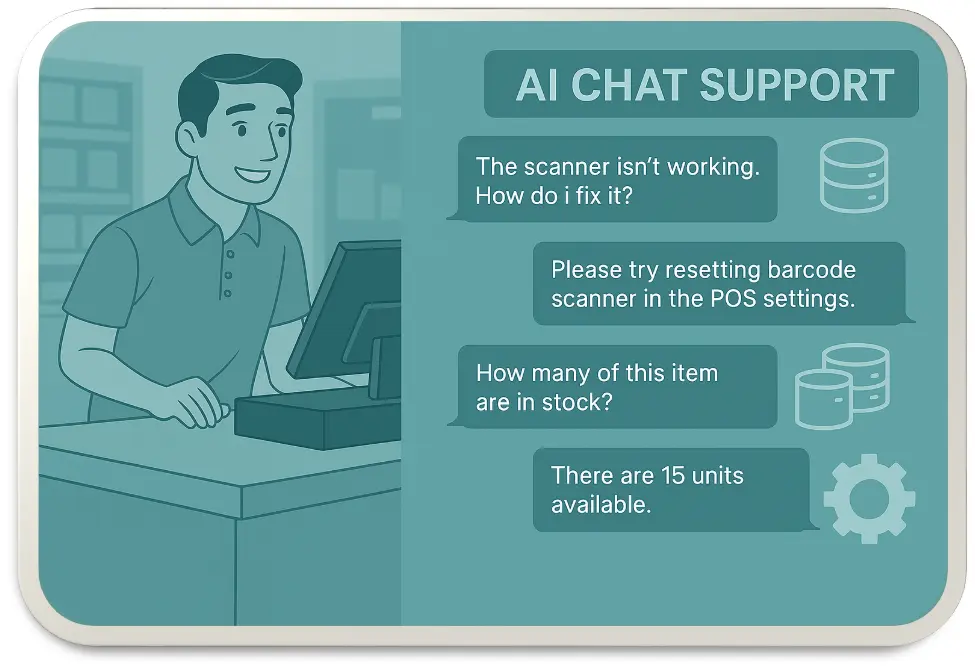Introduction
AI is rapidly transforming retail and e-commerce in enhancing customer experiences through personalized recommendations, automated customer service, inventory and order management, predictive analytics and many other aspects. Retailers are leveraging AI to optimize operations, improve engagement, and drive efficiency, making AI-driven automation a game-changer in the industry. This is now extending to customer and technical support, revolutionizing the way consumers interact with modern businesses.
Generative AI is reshaping customer and technical support in retail by automating interactions, streamlining troubleshooting, and improving overall service quality. Currently, most support models rely on generalized call centers, often far away from the customers they support. As a result, they struggle with inefficiencies such as long wait times, inconsistent responses, language/accent issues and high operational costs. AI-powered solutions are addressing these challenges by providing instant, accurate, and context-aware assistance across multiple channels, including chat, email, and voice support.
In this article, we’ll explore how Generative AI is disrupting customer and technical support, highlighting its benefits, such as increased efficiency, multi-lingual support, reduced costs, and 24/7 availability. We’ll also discuss the challenges retailers and businesses must navigate, including AI limitations, data privacy concerns, and the balance between automation and human interaction. Let’s dive into the future of AI-driven support and its impact on the industry.
Challenges with the Traditional Support Model
Customer support has long relied on centralized call centers, often outsourced and offshored. While this model has helped businesses reduce costs to a certain extent, this comes with significant challenges. Many support teams are staffed with people who may not have deep expertise in the businesses they support, leading to inconsistent service quality, and customer frustration. As businesses expand globally, the limitations of traditional support models become more evident, impacting both operational efficiency and customer satisfaction.
- High Operational Costs – One major challenge is the high operational cost of maintaining human-driven support teams, especially when businesses need to provide support in multiple languages. Hiring, training, and retaining knowledgeable and multilingual support agents require substantial investment, making it difficult to scale efficiently while ensuring quality service.
- Long wait times and inconsistent service quality – Centralized call centers often struggle with high call volumes, leading to long hold times and rushed interactions. Inconsistent agent training results in varying levels of expertise, making it difficult to provide uniform and reliable support.
- Scalability – During peak periods, such as product launches or holiday seasons, support teams may become overwhelmed, causing delays and negatively impacting customer experience. Scaling up requires hiring and training additional staff, which is neither fast nor cost-effective.
- Outdated Information and Knowledge Gaps – Traditional support teams also rely heavily on knowledge documents and FAQs. These resources often fail to provide up-to-date information, forcing agents to rely on personal experience rather than a structured knowledge base, leading to inconsistent troubleshooting and inaccurate responses.
- Multi-Lingual support – Language barriers further complicate technical support, especially when product manuals, troubleshooting guides, and documentation are not available in all the languages businesses need to support.
As these challenges persist, retailers and businesses are turning to Generative AI to bridge these gaps, offering faster, more scalable, and cost-effective customer support solutions.
How Generative AI is Transforming Retail Customer Support

Generative AI is fundamentally reshaping customer support by overcoming the limitations of traditional models. By leveraging advanced natural language processing (NLP) and LLMs, AI-powered support systems deliver faster, more accurate, and highly personalized assistance.
1. AI-Powered Chatbots and Virtual Assistants
Generative AI-driven chatbots and virtual assistants offer real-time, intelligent support that mimics human conversations while providing instant, scalable, and cost-effective solutions.
- Conversing in Natural Language: Unlike traditional rule-based chatbots, AI-powered assistants understand and generate human-like responses, making interactions smoother and more engaging. They can interpret intent, context, and even sentiment, leading to more effective resolutions.
- Automating Common Tasks: AI assistants not only answer customer questions but also help users complete common tasks through automation, all within natural language interactions. Whether it’s resetting a password, issuing a gift receipt, resolving a software error, or troubleshooting a technical issue, AI can guide users step-by-step or perform tasks automatically. By understanding intent and context, AI assistants make interactions more seamless, reducing the need for manual effort and improving efficiency.
- Always Available, Scalable and Low-Cost: AI can simultaneously manage thousands of queries across different channels, available 24/7 regardless of time zones or peak demand, reducing dependency on large call center teams. This results in substantial cost savings while ensuring consistent and high-quality service.
2. Consistent and Up-to-Date Knowledge
One of the major challenges in traditional support is reliance on static knowledge bases, which often become outdated as products and technical systems evolve. AI powered knowledge systems ensure information is always current and accurate.
- Automated Updates: AI-driven knowledge bases are continuously updated to reflect the latest software releases, hardware upgrades, and policy changes, eliminating reliance on outdated documentation.
- Real-Time Learning: AI systems analyze user interactions, identify knowledge gaps, and refine their responses over time, improving accuracy and relevance.
- Consistent Responses: Unlike human agents who may provide varied responses based on experience, AI delivers uniform and precise information, ensuring consistency across all support interactions.
3. Multilingual and Omnichannel Support
Generative AI eliminates language barriers and seamlessly integrates with multiple communication channels, providing a truly global and unified support experience.
- Real-Time Language Translation: AI-powered chatbots can translate queries and responses in real time, allowing retailers and businesses to serve international customers without hiring multilingual support staff.
- Omnichannel Integration: AI-driven support systems can operate across chat, email, phone, and social media platforms, offering a seamless and unified customer experience.
- Adaptability to Regional Dialects: Advanced NLP models can recognize and process regional dialects, slang, and culturally specific phrases, making interactions more natural and effective.
4. Personalized, Context Aware and Emotionally Intelligent Support
Advancements in AI technology have enabled a new level of personalization in customer support by leveraging sentiment analysis, historical interactions, and contextual awareness. AI-enabled systems are able to understand customer emotions, recall past conversations, and adapt their responses in real time, creating a more intuitive and engaging support experience.
- Sentiment Analysis for Better Engagement: AI can detect a customer’s tone, frustration level, or urgency by analyzing their language and choice of words. This allows the system to adjust its responses accordingly, offering a more empathetic tone for users or a concise response for those seeking quick solutions.
- Context-Aware Responses: AI Assistants can not only learn from previous conversations to enable a precise solution to the issues without the users having to repeat everything, but also customize and tailor the conversation to users’ preferences, leading to a smoother and more satisfying experience.
- Proactive Assistance: By analyzing trends in customer inquiries, AI can predict potential issues and offer proactive solutions. For example, if multiple users report similar technical issues, AI can suggest fixes even before the customer reaches out for support.
By implementing Generative AI in customer support, retailers and businesses can drastically improve efficiency, reduce costs, and provide more seamless, personalized, and intelligent customer experiences. It is important to recognize that this transformation is not just about automation, it’s about creating smarter, more responsive support systems that are ready for tomorrow’s needs.
Building AI Right – Importance of Solid Architectural Foundation
With AI and retail technology landscape evolving rapidly, it is essential to start with a strong architectural foundation that can only improve current capabilities but also be able to adapt to technology advancements and growing demands. Building integrations with existing enterprise systems will help the AI systems utilize existing knowledge base and data and learn from real-life examples in order to provide efficient customer service.
1. Designing a Flexible and Scalable Architecture
A robust architecture is the backbone of a successful AI-powered system. Agentic AI can help businesses and retailers develop specialized, reusable AI agents that handle specific tasks such as answering FAQs, processing orders and returns, or troubleshooting issues. This modular approach ensures that the system remains adaptable, allowing businesses to add or refine AI agents without overhauling the entire framework.
- An Agentic AI framework enables the development of specialized AI agents designed for specific tasks, such as handling customer inquiries, troubleshooting login issues or resetting passwords, or performing register operations. By breaking down AI functionality into modular, task-specific agents, an Agentic AI framework can ensure higher accuracy, better automation, and easier maintenance. This approach also allows for dynamic orchestration, where different agents collaborate seamlessly to resolve complex queries, improving the overall customer experience.
- Implementing Retrieval-Augmented Generation (RAG) enhances response accuracy by grounding AI-generated answers in a trusted knowledge base and up-to-date information. We can further assess reliability of AI responses by understanding its confidence on generated responses, allowing the system to escalate uncertain queries to human agents or request additional validation before responding.
2. Integration with Enterprise Systems
An AI-powered support system is only as effective as the knowledge it can access and systems it can connect to. Integrating the AI framework with core business systems will not only enable it to retrieve the most up-to-date knowledge but also enables it to execute tasks to help resolve the issues end-to-end.
- Real-time Access to Knowledge, Data, and Information via integrations with core business systems such as Enterprise Service Management (ESM), Point of Sale (POS), CRMs, and knowledge bases enables the AI system to analyze all of the relevant information, learn from recent technical issues & their resolutions and deliver personalized and accurate service aligned with the latest business operations.
- Connecting the AI systems with core technology systems that can help execute tasks on the users’ behalf transforms the AI framework from being conversational to being actionable. This not only reduces the need for human handoffs, but also shortens resolution times, and delivers a more seamless and efficient experience.
3. Avoiding Vendor Lock-In for Long-Term Flexibility
The AI landscape is evolving rapidly, with new models, frameworks, and platforms emerging constantly. Instead of locking into a single technology vendor, retailers and businesses should focus on building solutions that remain adaptable. Using open-source technologies, API-based integrations, and cloud-agnostic architectures ensures that companies can switch or upgrade AI components as better solutions become available.
Ethical Considerations of Using AI in Customer Support
While Generative AI offers numerous advantages in transforming customer support, its adoption also brings some challenges and ethical considerations. From potential biases in AI responses to concerns about privacy and the balance between automation and human empathy, retailers and businesses must carefully navigate these complexities to ensure AI-driven support remains reliable, fair, and secure.
1. AI Biases and Potential Inaccuracies
Generative AI models are only as good as the data they are trained on. If the training datasets contain biases—whether in language, demographics, or historical support resolutions—AI can unknowingly reinforce these biases in its responses.
- Understanding Training Data Lineage: AI models inherit patterns from their datasets, which may include biased or outdated information, leading to inaccurate or unfair responses.
- Risk of Misinformation: AI-generated responses may sound confident but can sometimes be incorrect or misleading, particularly when handling complex technical issues.
- Mitigation Strategies: Businesses must continuously audit AI outputs, retrain models with diverse and updated data, and implement human oversight to reduce bias-related risks.
2. Balancing efficiency with guardrails for sensitive situations
AI is great at answering common questions and handling routine tasks quickly, but it may struggle to handle sensitive situations, which are very critical in customer interactions. To overcome this, retailers and businesses should use a hybrid approach where AI manages high-volume, straightforward issues while smoothly handing off sensitive interactions to human agents.
For this to work effectively, the AI-enabled customer support technology systems should be designed with guardrails to recognize distress or sensitive sentiment in customer messages, ensuring that customers receive the right level of support when they need it most. Based on our experience and surveys, we’ve found that 5 to 10 specific issues make up more than half of all customer inquiries. This concentration of common requests allows AI to deliver the greatest impact, improving efficiency while freeing up human agents for more complex concerns.
3. Data Privacy and Security Concerns in AI-Enabled Support
As AI systems process vast amounts of customer data, ensuring privacy and security becomes a critical concern.
- Handling Personally Identifiable Information (PII): AI-driven support must comply with regulations such as GDPR, CCPA, and other data protection laws to safeguard sensitive customer information.
- Preventing Unauthorized Data Access: AI models should be designed with strict access controls to prevent misuse of stored conversations and ensure encryption of sensitive data.
- Transparent AI Practices: Businesses must be transparent about how AI collects, stores, and uses customer data, building trust and ensuring ethical AI adoption.
By addressing these challenges proactively, retailers and businesses can harness the power of AI-driven customer support while ensuring fairness, security, and a balance between automation and human connection.
Conclusion
Generative AI is revolutionizing technical and customer support in retail and eCommerce by reducing costs, ensuring consistent resolutions, and improving efficiency. By automating routine queries, providing instant responses, and personalizing interactions, AI enables retailers and businesses to scale support while maintaining high-quality service.
However, embracing AI also requires retailers and businesses to build trust with their customers – addressing challenges around ethical usage, data privacy, and seamless human-AI collaboration. Businesses must implement responsible AI practices and ensure transparency, fairness, and security in their usage.
The future of support is AI-driven, and businesses that adopt these technologies early will gain a competitive edge. Is your support team ready for AI disruption? Now is the time to explore AI solutions, train teams for hybrid (human + AI) support, and future-proof your customer service strategy.
About SkillNet
SkillNet Solutions provides consulting, AI solutions, and technology services to companies digitally transforming their business for modern commerce. We combine best‑in‑class engineering, AI‑driven innovation, retail‑industry expertise, and design capabilities to help retailers deliver seamless shopping experiences. SkillNet partners with leading platforms – including AWS, Oracle, commercetools, Contentstack, Kibo, Mirakl, Salesforce Commerce Cloud, SAP Commerce Cloud, Spryker, and VTEX – to elevate in‑store and digital commerce experiences. Since 1996, we’ve worked with hundreds of retailers in 53 countries, driving sustained revenue growth.






 Engenharia
Engenharia






